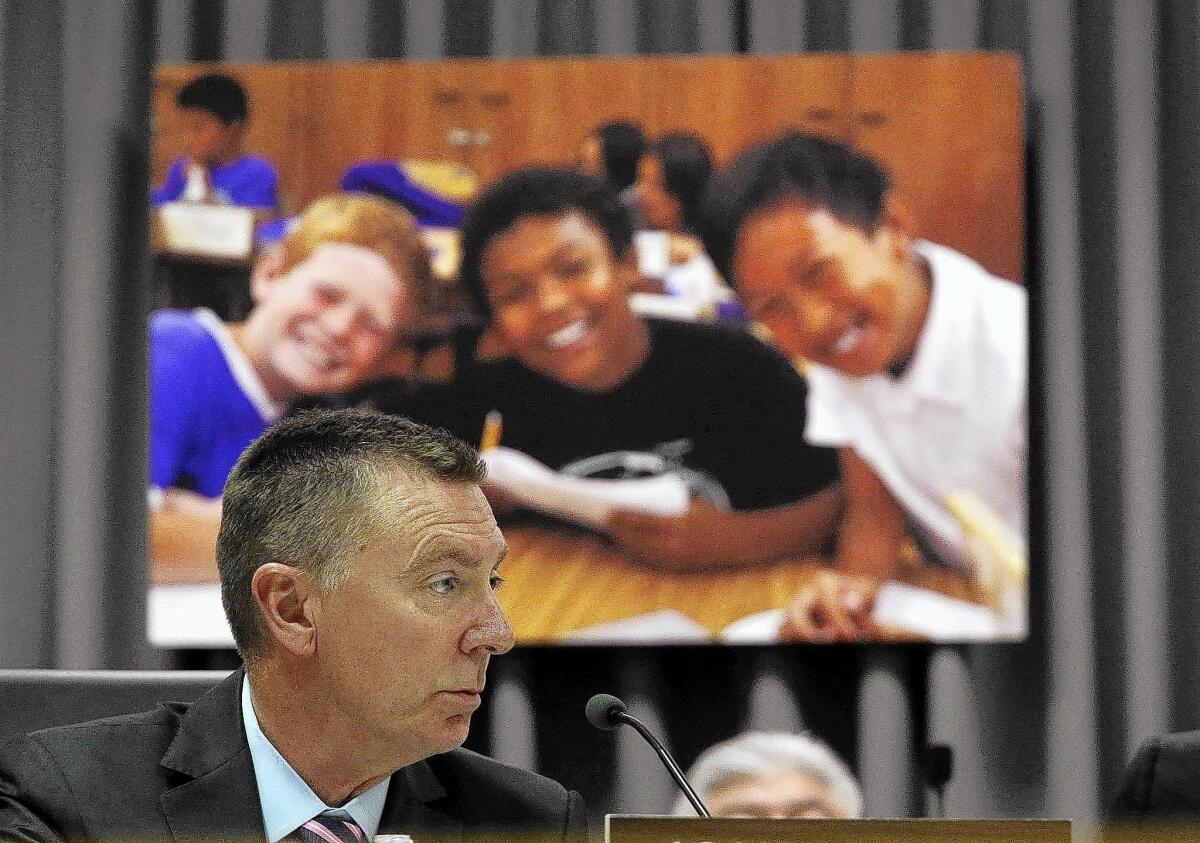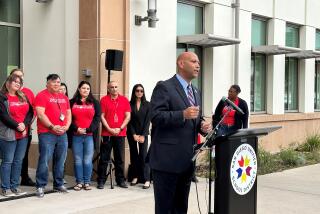School board starts weighing Supt. Deasy’s evaluation

- Share via
The Board of Education began deliberations Tuesday on the evaluation of Supt. John Deasy, who has come under fire for his handling of a $1.3-billion effort to provide iPads to all students and for what critics call an autocratic, ineffective leadership style.
It remained unclear Tuesday evening whether the board would move against Deasy at a later date; an evaluation has been scheduled for Oct. 21. After the four-hour closed-door meeting, no action was reported.
“We haven’t decided anything, and we agreed not to talk about it,” said board President Richard Vladovic. “We all agreed not to discuss anything because it is to be continued. I can’t say anymore because I promised not to say a word.”
Relations between Deasy and the board have deteriorated, especially in the wake of his push to provide computers to students, teachers and campus administrators.
Problems plagued the rollout of the computer effort last year at 47 schools. Then in August, a critical report by board member Monica Ratliff raised numerous questions. Critics, including other board members and the teachers union, have charged that Deasy moved too quickly, without adequate planning or a long-term funding plan to sustain the effort.
And emails between Deasy, his former top deputy and the companies that eventually won the contract led to increased scrutiny. Deasy has denied any impropriety and defended the technology program as a civil rights imperative.
Deasy has talked lately of having different priorities from the board and said he has considered whether he should remain in the job. He declined to discuss the impending board deliberations early Tuesday, but said he is proud of his work.
Critics and supporters alike have predicted that Deasy’s days as superintendent were dwindling, but have offered different views on the cause.
Deasy’s supporters characterize the superintendent as a victim of petty animosities and the influence of the teachers union, along with a general resistance to change in the giant organization.
A group of local organizations and business leaders, known as the Civic Alliance, hailed district progress under Deasy in a letter to the board.
“Superintendent Deasy has brought an unrelenting focus on poor children of color and there has been much progress as a result of his leadership,” according to the letter, which criticized the board. “If the Board remains unfocused, we run the risk of losing the student achievement gains we have made during a short period of time.”
Names already have been quietly floated for possible interim leaders. One possibility circulated internally was Deputy Supt. Michelle King, who, like Deasy, was asked not to attend Tuesday’s meeting.
Deasy came to the district four years ago as deputy superintendent, and the presumed heir apparent to Ramon C. Cortines, who turned over the job in April 2011.
Deasy oversaw a rise in student test scores and improved graduation rates — mostly during a period of budget cutting. Two major moves, reducing student suspensions and providing breakfast in classrooms, won praise for good intentions but some criticism for how they were carried out.
Deasy also used his position at the helm of L.A. Unified to alter the education landscape in California.
One case in which Deasy participated, called Doe vs. Deasy, forced L.A. Unified — and other school districts — to follow state law requiring student achievement to be part of a teacher’s evaluation.
Later, Deasy emerged as a star witness in a lawsuit, Vergara vs. California, that overturned key teacher job protections. That ruling, which is on hold pending an appeal, eliminated tenure, shortened the dismissal process and set aside the use of seniority to determine who is laid off.
Such efforts made Deasy a hero to philanthropists and others who have focused in recent years on improving the teaching corps and weakening the influence of teachers unions.
Some board members and district insiders, however, expressed consternation over Deasy’s apparent encouragement of lawsuits against the school district for which he worked.
Deasy’s job also was put in greater peril when his allies failed in elections to defeat four current board members.
For more than a year, Deasy could call on only two firm supporters on the seven-member board. Still, the other members were unwilling to move against Deasy for various reasons.
That changed with the fallout over technology.
When board members began to seize on that issue, Deasy, through a private attorney, tried to turn the tables. He filed a Public Records Act request seeking information that might link members to technology vendors.
Another technology problem arose at the beginning of the school year when a new student records system resulted in chaos at many campuses.
Board member Bennett Kayser said in a recent interview that Deasy’s leadership has been epitomized by an excessive sense of “ ‘We want to be No. 1.’ That was the attitude that was conveyed — being the organization that drives what will be the norm. There’s a desire to be first.”
Deasy’s supporters said the technology stumbles are more of an excuse than a rationale for his potential dismissal. They point to the close ties of some board members to the teachers union, United Teachers Los Angeles.
Stalled contract talks with UTLA have only exacerbated Deasy’s problems. Deasy doesn’t think the union is willing to reach a deal with him — a point on which some of his supporters and critics agree.
Twitter: @howardblume
More to Read
Sign up for Essential California
The most important California stories and recommendations in your inbox every morning.
You may occasionally receive promotional content from the Los Angeles Times.














